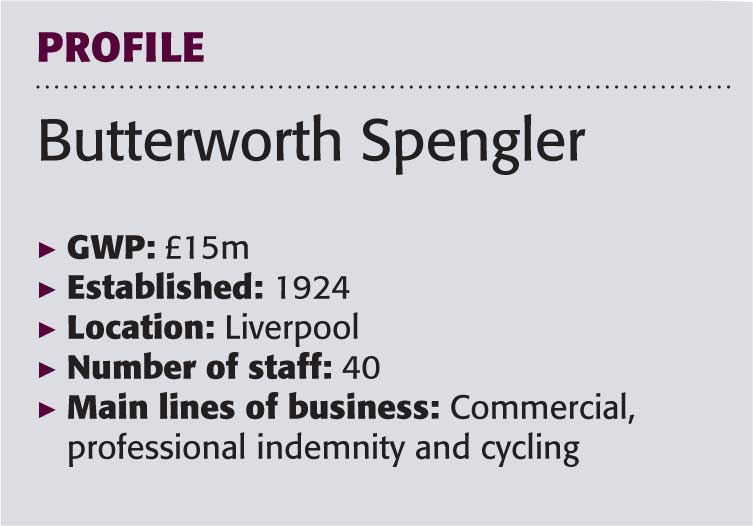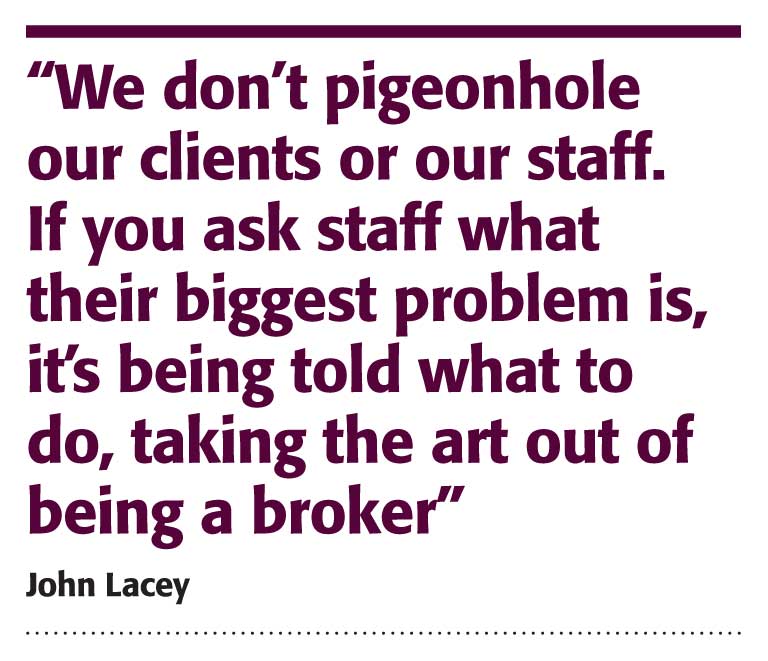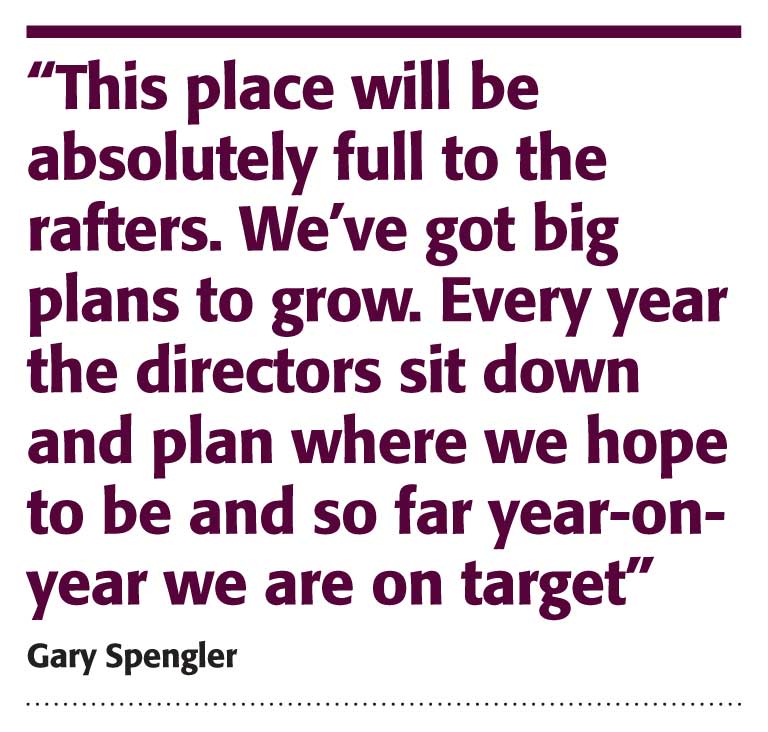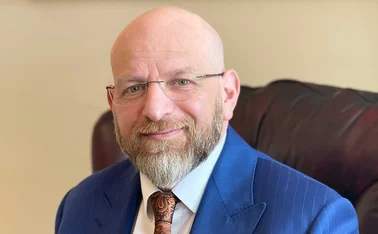
Broking success: Gearing up for growth
Managing director Gary Spengler and director John Lacey explain how Butterworth Spengler became the go-to broker for cycling and why growth will come from old-fashioned broking. Andrew Pearce writes
▶ What is the broker’s history?
Gary: We were formed in 1924 so I’ve got quite a pedigree through the family. As this lot often joke I was obviously the founder! My grandfather founded it, he actually was in insurance a lot longer than that but he fought in the First World War and when he came back set up EL Spengler on his own. He died in 1964, my father then took over and, in about 1985, I assumed running the company. In April 2001 we joined with Butterworth to become Butterworth Spengler and the rest, as they say, is history.
 ▶ What is your broking ethos?
▶ What is your broking ethos?
Gary: I took the ethos from my father. I’ve always had a slightly more unusual attitude to insurance broking than many of my counterparts. I firmly believe we are a family, we all come into it to make a career and ultimately we’ve all got to make money. But we’re here to give a service and I’m fond of saying everything is a marathon, nothing is a sprint. We are the old-fashioned broker, I go to so many meetings nowadays where they’re talking about SME business. What’s the definition of SME, what sized business do you throw into the morass with an insurer to get enhanced commissions? All these things are important in one respect but you’re first and foremost a broker. You’re there to look after people and offer them a good service.
John: Our retention rate is phenomenal. We don’t pigeonhole our clients or our staff. If you ask staff what their biggest problem is, it’s being told what to do, taking the art out of being a broker and just trying to hit targets and place business in certain markets. That’s not what we’re trying to do.
▶ Is your client base local or national?
John: We have got a lot of SME business and that’s our foundation, but over the last seven years we’ve expanded and gone for more corporate business. We’re looking to expand into the rest of the UK so we don’t really have any geographical limit. We just want to make sure it’s the type of business we can look after properly, with the correct support from the insurers, and deal with the claims correctly. If that fits in with our philosophy we will go after it regardless of geographical areas.
▶ Where does your cycling specialism come from?
Gary: That was a Butterworth specialism. One of my ex-directors saw an opportunity to start dealing with the Cyclists’ Touring Club in 1985, so it goes back a long way.
John: Cover is anything for an individual cyclist with a £1,000 bike up to the likes of the Barclays Cycle Hire scheme [in London]. We do a lot of clients from shops right up to city councils, to the extent we’ve been invited to quote a few cities in Spain. We’ve been to Spain numerous times over the last three years to give them advice on how we’ve done the scheme for Transport for London (TfL). We’ve got ourselves into a situation where the industry knows us as specialists. Although it only represents 10% of our turnover we are the specialist in that field, so people come to us asking for advice – not just on the insurance side as well.
 ▶ The Barclays Cycle Hire deal must have been a significant win?
▶ The Barclays Cycle Hire deal must have been a significant win?
John: We were up and down to London like you wouldn’t believe, trying to nail it. We didn’t win it on price either, it was on the service.
Gary: At the time we were asked to be involved, the holding broker had it for at least six months and hadn’t obtained any quotes, primarily because they didn’t know the questions to ask. One of the reasons we won the business was because we said this is the question you need to ask, this is the answer, and we were actually telling them what they needed to do.
John: One of the key areas was how we deal with claims. TfL was very, very concerned about the impact of claims on public relations and how it would be perceived in the event of something going wrong. We could ask insurers how many claims were going to come in, how much they were going to settle for and what the impact would be. By doing that you can give a five-year, ten-year picture and when you’ve got 30 years of data you can plan that out. Somebody fresh in the industry just wouldn’t know that. You can’t treat cycle claims the same as public liability claims.
▶ What have been the biggest changes in insurance broking over the years?
John: Insurers’ attitude to paying claims. In the event that something goes seriously wrong, we need to see how the insurance company will respond. Sometimes you think, if that goes wrong, I haven’t got the confidence in that particular company. That’s not good for the industry’s reputation, that’s not good for the clients and that’s not good for us as well. I can’t see that ending anytime soon. If I were the regulator I’d be looking at claims and saying this is about fairness, there’s a big issue about Treating Customers Fairly. You shouldn’t be looking at ways not to pay a claim, you should be looking for ways to pay a claim. Getting out on a technicality is not what we are in the industry for. It’s not what the insurance companies profess themselves to be about and it’s not what clients expect.
 ▶ How long has this been going on?
▶ How long has this been going on?
John: The last three years in particular. I can’t recall a decent-sized claim where we haven’t had to fight to get what clients are due. That shouldn’t be the case. When the policyholder has paid their premium and is struggling, had a loss, the business is at risk and they need the cash flow going through their business, then they shouldn’t be fighting to get what they deserve. And if we hadn’t fought for them, where would the client have been? We have had to go in and do the insurance companies’ and loss adjusters’ jobs. The frustration for me is we know that the loss adjuster and the insurance company know the score.
▶ What is the one thing you would change in broking?
John: The perception of professionalism. We provide a service which I believe is akin to solicitors and accountants, yet we’re not seen as being on the same level. We can’t charge the same hourly rates or same fees but we protect people’s businesses, their personal assets, their homes and their cars. They expect us to look after them in the event of a claim and yet we’re not seen to be as professional.
▶ What do you make of recent controversies involving unrated insurers in professional indemnity (PI) insurance?
John: We try to provide a quality service and are coming up against people using companies we will not trade with. Existing clients who want to stay with us have received much lower quotations from these offshore and unrated companies and we will not deal with them. We will not compromise ourselves or our clients. We’re very security conscious when it comes to insurers. Although we are fiercely independent and have a large number of agencies, we will only deal with those of a certain standard. We look at the security before we place risks, we have a panel and we look at that on a monthly basis. We won’t lower our standards just to place business.
▶ What is your target over the next five years?
Gary: This place will be absolutely full to the rafters. We’ve got big plans to grow. Every year the directors sit down and plan where we hope to be and so far year-on-year we are on target.
John: We’d be disappointed if we earn less than £20m gross written premium (GWP) in five years’ time. We’re growing significantly but it’s profitability that we’re looking at. We’re not just chasing numbers for the sake of GWP, we’re chasing profitability. We want to be stable and be a good broker to clients and insurers.
Only users who have a paid subscription or are part of a corporate subscription are able to print or copy content.
To access these options, along with all other subscription benefits, please contact info@insuranceage.co.uk or view our subscription options here: https://subscriptions.insuranceage.co.uk/subscribe
You are currently unable to print this content. Please contact info@insuranceage.co.uk to find out more.
You are currently unable to copy this content. Please contact info@insuranceage.co.uk to find out more.
Copyright Infopro Digital Limited. All rights reserved.
As outlined in our terms and conditions, https://www.infopro-digital.com/terms-and-conditions/subscriptions/ (point 2.4), printing is limited to a single copy.
If you would like to purchase additional rights please email info@insuranceage.co.uk
Copyright Infopro Digital Limited. All rights reserved.
You may share this content using our article tools. As outlined in our terms and conditions, https://www.infopro-digital.com/terms-and-conditions/subscriptions/ (clause 2.4), an Authorised User may only make one copy of the materials for their own personal use. You must also comply with the restrictions in clause 2.5.
If you would like to purchase additional rights please email info@insuranceage.co.uk







